New Matches for 2009
By Red Sun SASS#635 |
Iron Buffalo Rifle Match
Date: Sunday, March 15
6 Stages
This year we are adding another match that will be a “rifle”
only event. This concept is nothing new. Some of us have experienced these
at Devore with the Cajon Cowboys. These were a lot of fun and gave everyone
a chance to bring out those guns that you got a chance to shoot once with
maybe 5 to 10 rounds at a side event. At Devore, you had the opportunity
to shoot all three guns individually at a stage. So if brought all three
types, pistol caliber lever/pump, a rifle caliber lever, and a single shot,
you got to shoot 3 times at every stage! I was usually beat by the time
I finished those matches but it was a hoot.
So this year, a “new” Iron Buffalo Rifle Match will be
held at the RR Bar in Lucerne Valley. So, if you like to shoot rifles,
here’s your chance. We’re going to try something different this time. You
will be shooting rifles in pairs. What you’ll need is your pistol caliber
rifle (your usual CAS rifle) and a rifle caliber gun. This pair will constitute
a category based on the style of the rifle. The stages will be configured
so that you shoot both guns. The plan is for you to shoot 7-10 rounds for
the pistol caliber and 5 to 7 for the rifle caliber at each stage. Now
if you have a lever gun, single shot in rifle caliber, and/or a Wild Bunch
style rifle, you can sign up for 2 or more categories. So when you shoot
that additional category, you will again shoot your CAS rifle again with
that rifle caliber gun. All of the detail information is posted with the
entry info.
Since we are a Black Powder organization, all ammunition
will be shot with Black Powder or substitutes except for the Wild Bunch
category where both rifles can be shot with smokeless. Now we would like
all of you interested to come out and participate in this match so for
those of you that are shy about this BP stuff, we welcome you to come and
shoot with your “white powder”. You can sign up and shoot as our “guest”
and will be scored but out of the running for awards. It’s our offer to
you to be involved and maybe learn a few tidbits about shooting with Black
Powder from others.
Linea de Fuego (“Line of Fire”)
Date: Sunday, May 17
6 Stages
After Frontier Days No 12 this year I decided to stop
there and think about something different. I’ve shot a few Wild Bunch matches
and enjoyed them. Being able to use some of these transitional guns in
CAS style is great especially with the costuming and leather gear that
go with the Colt 1911 era guns. Since I’m a collector and a fanatic about
cartridge development and history, an event that crosses the threshold
of Black Powder to Bulk Smokeless Powder (transitional 1895) became an
idea. So here we are again trying another new thing. Linea de Fuego is
a Bill Hahn creation. He started this with the Combat Pistol arena back
in the 1980’s. A group is still active down in San Diego and information
is on the web. This is mainly a practical pistol/IPSC organization. I decided
to take this to another level at RR Bar. On May 17th we will run a continuation
of Frontier Days where we include the Wild Bunch category and a few twists
to the existing set of categories. This match, Linea de Fuego, will be
the era that combines Black Powder and Smokeless powder cartridges. I figured
that instead of just a Wild Bunch match; why not include it as a category?
A good number of you shoot 2 categories in these matches anyway, so here’s
a chance to shoot Black and Smokeless at the same match. So with these
disciplines all meshed together, we should have an interesting group of
shooters. All of the details will be posted by Jan 31st, 2009.
For both of these matches, I have contracted Karin’s BBQ
for the lunches. If you were at Thunder Valley in November 2008, you will
remember that great lunch that was served. Well, it’s going to be available
again and included with the match fee provided you pre-register within
the prescribed date. A small fee will be imposed for late registration.
Hope to see you there and for any questions or comments, I can be reached
by phone or e-mail. The contact info is on this web site.
Adios for now,
Red Sun
| “Savor the nostalgia of the Old West and don’t worry
about your score!” |
.
|
Horace Greeley from Wikipedia,
the free encyclopedia
| Horace Greeley (February 3, 1811 – November
29, 1872) was an American editor of a leading newspaper, a founder of the
Liberal Republican Party, a reformer, and a politician. His New York Tribune
was America's most influential newspaper from the 1840s to the 1870s and
"established Greeley's reputation as the greatest editor of his day."Greeley
used it to promote the Whig and Republican parties, as well as antislavery
and a host of reforms. Crusading against the corruption of Ulysses S. Grant's
Republican administration, he was the new Liberal Republican Party's candidate
in the 1872 U.S. presidential election. Despite having the additional support
of the Democratic Party, he lost in a landslide.
Early life
Greeley was born on February 3, 1811, in Amherst, New
Hampshire, the son of poor farmers Zaccheus and Mary Greeley. He declined
a scholarship to Phillips Exeter Academy and left school at the age of
14; he apprenticed as a printer in Poultney, Vermont, at The Northern Star,
moving to New York City in 1831. In 1834 he founded the weekly the New
Yorker, which consisted mostly of clippings from other magazines.
In 1836 Greeley married Mary Cheney Greeley, an intermittent
suffragette. Horace Greeley spent as little time as possible with his wife
and would sleep in a boarding house when in New York City rather than be
with her. Only two of their seven children survived into adulthood.
The New York Tribune
-----------------------------------------------
Whig
In 1838 leading Whig politicians selected him to edit
a major national campaign newspaper, the Jeffersonian, which reached 15,000
circulation. Whig leader William Seward found him "rather unmindful of
social usages, yet singularly clear, original, and decided, in his political
views and theories." In 1840 he edited a major campaign newspaper, the
Log Cabin, which reached 90,000 subscribers nationwide, and helped elect
William Henry Harrison president on the Whig ticket. In 1841 he merged
his papers into the New York Tribune. It soon was a success as the leading
Whig paper in the metropolis; its weekly edition reached tens of thousands
of subscribers across the country. Greeley was editor of the Tribune for
the rest of his life, using it as a platform for advocacy of all his causes.
As historian Allan Nevins explains:
The Tribune set a new standard in American
journalism by its combination of energy in news gathering with good taste,
high moral standards, and intellectual appeal. Police reports, scandals,
dubious medical advertisements, and flippant personalities were barred
from its pages; the editorials were vigorous but usually temperate; the
political news was the most exact in the city; book reviews and book-extracts
were numerous; and as an inveterate lecturer Greeley gave generous space
to lectures. The paper appealed to substantial and thoughtful people.
—Nevins, Dictionary of American Biography (1931) |
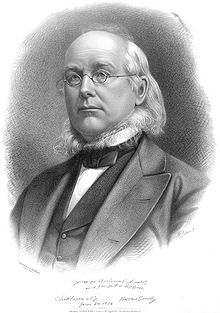
1872 portrait of Greeley by J.E. Baker
Member of the U.S. House of Representatives
from New York's 6th district
In office December 4, 1848 – March 3, 1849
Preceded by David S. Jackson
Succeeded by James Brooks
Born February 3, 1811(1811-02-03)
Amherst, New Hampshire, U.S.
Died November 29, 1872 (aged 61)
Pleasantville, New York, U.S.
Political party Whig, Democrat, Republican
Spouse Mary Cheney Greeley
Profession Editor, Politician
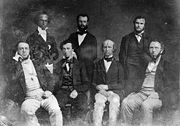
New York Tribune editorial staff. Greeley is third from
the left in the front row.
|
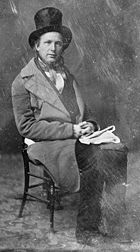
Photograph of Greeley by Mathew Brady,
taken between 1844 and 1860
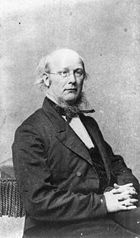
Horace Greeley
|
Greeley prided himself in taking radical positions on
all sorts of social issues; few readers followed his suggestions. Utopia
fascinated him; influenced by Albert Brisbane he promoted Fourierism. His
journal had Karl Marx (as well as Friedrich Engels) as European correspondent
in the early 1850s (although most of his views sharply contrasted with
the ones promoted by marxism). He promoted all sorts of agrarian reforms,
including homestead laws. He was elected as a Whig to the Thirtieth Congress
to fill the vacancy caused by the unseating of David S. Jackson and served
from December 4, 1848, to March 3, 1849.
Greeley supported liberal policies towards settlers; in
a July 13, 1865 editorial, he famously advised "Go West, young man, go
West and grow up with the country." Some have claimed that the phrase was
originally written by John Soule in the Terre Haute Express in 1851, but
it is most often attributed to Greeley. Historian Walter A. McDougall quotes
Josiah Grinnell, the founder of Iowa's Grinnell College, as saying, "I
was the young man to whom Greeley first said it, and I went."
A champion of the working man, he attacked monopolies
of all sorts and rejected land grants to railroads. Industry would make
everyone rich, he insisted, as he promoted high tariffs. He supported vegetarianism,
opposed liquor and paid serious attention to any "-ism" anyone proposed.
What made the ‘’Tribune’‘ such a success were the extensive news stories,
very well written by brilliant reporters, together with feature articles
by fine writers. He was an excellent judge of newsworthiness and quality
of reporting.
His editorials and news reports explaining the policies
and candidates of the Whig Party were reprinted and discussed throughout
the country. Many small newspapers relied heavily on the reporting and
editorials of the Tribune. He served as Congressman for three months, 1848--1849,
but failed in numerous other attempts to win elective office.
Republican
When the new Republican Party was founded in 1854, Greeley
made the Tribune its unofficial national organ, and fought slavery extension
and the slave power on many pages. On the eve of the Civil War circulation
nationwide approached 300,000. In 1860 he supported the ex-Whig Edward
Bates of Missouri for the Republican nomination for president, an action
that weakened Greeley's old ally Seward.
|
Greeley made the Tribune the leading newspaper opposing the
Slave Power, that is, what he considered the conspiracy by slave owners
to seize control of the federal government and block the progress of liberty.
In the secession crisis of 1861 he took a hard line against the Confederacy.
Theoretically, he agreed, the South could declare independence; but in
reality he said there was "a violent, unscrupulous, desperate minority,
who have conspired to clutch power" –secession was an illegitimate conspiracy
that had to be crushed by federal power. He took a Radical Republican position
during the war, in opposition to Lincoln’s moderation. In the summer of
1862, he wrote a famous editorial entitled "The Prayer of Twenty Millions"
demanding a more aggressive attack on the Confederacy and faster emancipation
of the slaves. A month later he hailed Lincoln’s Emancipation Proclamation.
Although after 1860 he increasingly lost control of the
Tribune’s operations, and wrote fewer editorials, in 1864 he expressed
defeatism regarding Lincoln’s chances of reelection, an attitude that was
echoed across the country when his editorials were reprinted. Oddly he
also pursued a peace policy in 1863-64 that involved discussions with Copperheads
and opened the possibility of a compromise with the Confederacy. Lincoln
was aghast, but outsmarted Greeley by appointing him to a peace commission
he knew the Confederates would repudiate.
Reconstruction
-----------------------------------------------
In Reconstruction he took an erratic course, mostly favoring
the Radicals and opposing president Andrew Johnson in 1865-66. In 1867,
Greeley was one of 21 men who signed a $100,000 bond for the release of
former president of the Confederacy Jefferson Davis. The move was controversial,
and many Northerners thought Greeley a traitor and canceled subscriptions
to the Weekly Tribune by the thousands.
Election of 1872
Main article: United States presidential
election, 1872
| After supporting Ulysses Grant in the 1868
election, Greeley broke from Grant and the Radicals. Opposing Grant's re-election
bid, he joined the Liberal Republican Party in 1872. To everyone’s astonishment,
that new party nominated Greeley as their presidential candidate. Even
more surprisingly, he was officially endorsed by the Democrats, whose party
he had denounced for decades.
As a candidate, Greeley argued that the war was over,
the Confederacy was destroyed, and slavery was dead — and that Reconstruction
was a success, so it was time to pull Federal troops out of the South and
let the people there run their own affairs. A weak campaigner, he was mercilessly
ridiculed by the Republicans as a fool, an extremist, a turncoat, and a
crazy man who could not be trusted. The most vicious attacks came in cartoons
by Thomas Nast in Harper's Weekly. Greeley ultimately ran far behind Grant,
winning only 43% of the vote.
This crushing defeat was not Greeley's only misfortune
in 1872. Greeley was among several high-profile investors who were defrauded
by Philip Arnold in a famous diamond and gemstone hoax. Meanwhile, as Greeley
had been pursuing his political career, Whitelaw Reid, owner of the New
York Herald, had gained control of the Tribune. |
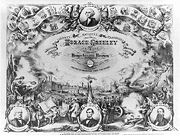
Greeley/Brown campaign poster
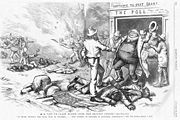
Greeley helps murder blacks in
an 1872 Thomas Nast cartoon |
Death
Not long after the election, Greeley's wife died. He descended
into madness and died before the electoral votes could be cast. In his
final illness, allegedly Greeley spotted Reid and cried out, "You son of
a bitch, you stole my newspaper." Greeley died at 6:50 p.m. on Friday,
November 29, 1872, in Pleasantville, New York at Dr. George C. S. Choate’s
private hospital. Greeley received no electoral votes, with the ones he
was to have received being scattered among others. However, three of Georgia's
electoral votes were left blank in honor of him. (Other sources report
Greeley receiving 3 electoral votes posthumously, with those votes being
disallowed by Congress.)
Greeley had requested a simple funeral, but his daughters
ignored this request and arranged a grand affair. He is buried in New York's
Green-Wood Cemetery.
The Greeley home in Chappaqua, New York, now houses the
New Castle Historical Society. The local high school is named for him,
and the name of one of the school newspapers pays homage to the 19th-century
paper owned by Greeley.
|
All articles submitted to the "Brimstone
Gazette" are the property of the author, used with their expressed permission.
The Brimstone Pistoleros are not
responsible for any accidents which may occur from use of loading
data, firearms information, or recommendations published on the Brimstone
Pistoleros web site. |
|